Publisher's Note: brockman_148 went in-depth on defensive coordinator statistics and created some terrific data visualizations. His time, effort, and work deserve to be featured on the front-page. Have a unique article idea or something similarly awesome you want to cook up, email sauces [at] thekeyplay dot com. — Joe
I've taken a hobby this offseason, crunching an awful lot of numbers. I owe this in part to finally completing my bachelor's degree – I have a lot more free time. And my wife analyzes data for a living, so sometimes I like to pull my little chair up to the adult table while she's working and nerd out with a pro.
After I ran the data for the Big Eleventy last winter and This Old Terrordome in the spring, I figured I scratched the itch and could wait until winter's post-season Big Eleventy sprint. Unfortunately, I developed a knee problem and I wasn't running as much, so I sat down and cracked open the internet.
This SB Nation Article — "Clemson's Brent Venables is the country's best defensive coordinator. Who's No. 2?" — irritated me, but why?
It took me a while to figure out what I don't like about SBN's take (other than its conclusion). Then I realized what bugged me. It's not a poorly written article. Rather, it's poorly titled.
Brent Venables is the hottest defensive coordinator right now. I'll buy that. Describing him as the best like it's not even close is far from accurate. However, after I calculated the data for 5 years back, I derived a list of 17 current FBS DCs. Ian Boyd's list intersects with mine. If you eliminate for lack of data/experience (Jeremy Pruitt, Lance Anderson), coaches with only recent co-DC experience (Randy Shannon and Greg Schiano) and take the top coordinators left, you end up with a list almost identical to his. Because I took exception to the exclusion of John Chavis, I ended up running numbers for these coordinators: Dave Aranda, Don Brown, Bud Foster, Pete Kwiatkowski, Brent Venables, and Chavis to see how they stack up.
My first impulse was to just start calculating numbers and see where I got with that. I got to work processing all of the Virginia Tech defensive stats year-by-year directly from HokieSports.com. In parallel, I started a game-by-game chart in Excel focused on opposing QB performance. The extent of these comparisons were largely abandoned due in part to the amount of time it took just to compile the data for one DC; and when I started to try to utilize other team sites with much less success, I realized that I was going to have to rely on multiple sources of data for comparison. I did end up with something to show for this, but I elected not to attempt to go through with this comparison for all of these DCs.

The QB data here was only run for FBS QBs with a significant contribution in the game, as I compared those statistics against the entire season statistics. FCS teams don't have season stats in this database.
Once I ran through these statistics for Bud Foster, I had a clearer idea with which data to extract and how to proceed for comparison with the rest of the DCs.
Alright, let's peel back this onion.
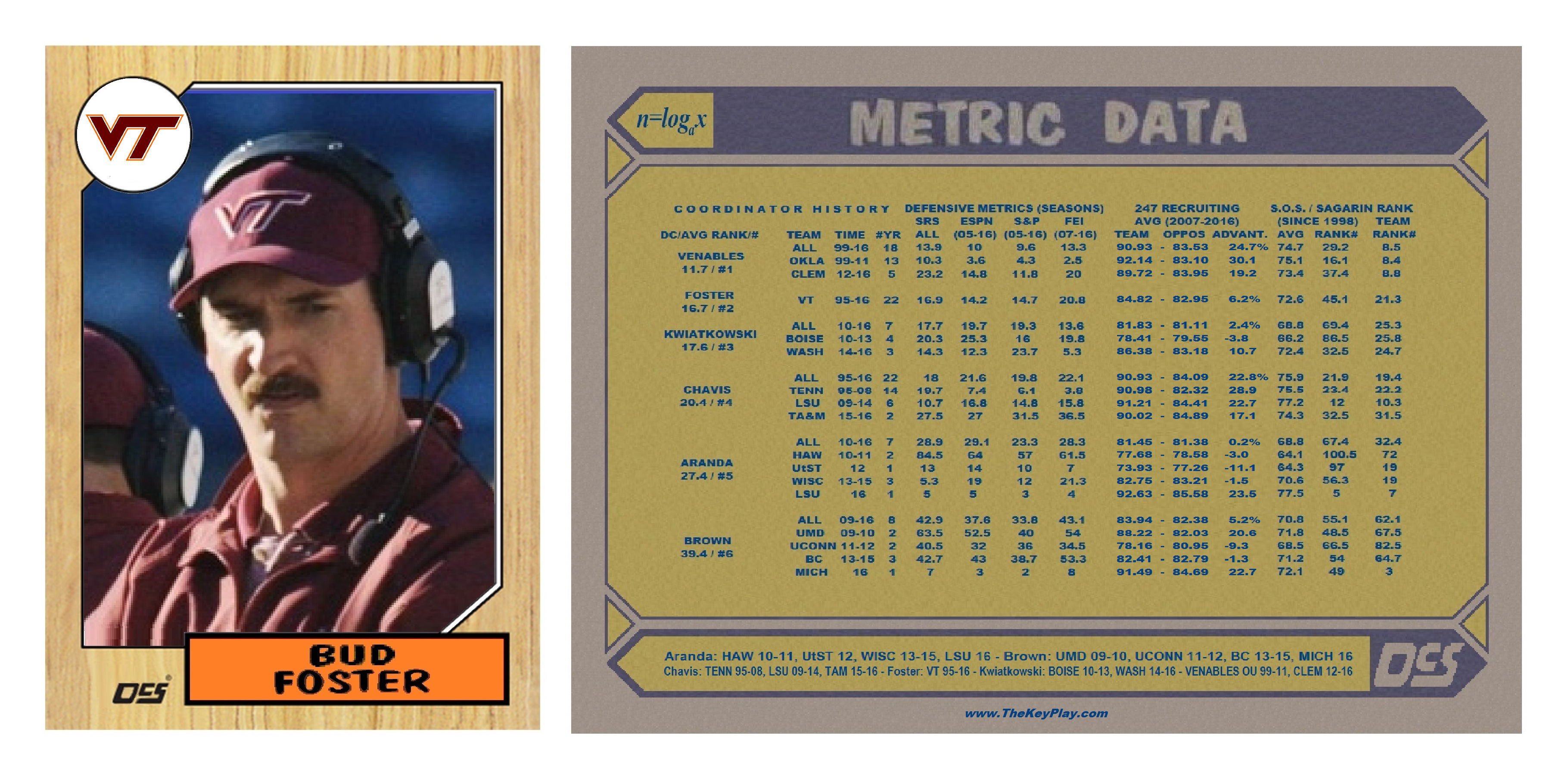
Average out the four advanced statistics (ESPN, S&P, FEI, and SRS) totals for all of these DCs and Brent Venables wins. It's not particularly close, either. Venables averages out to a rank of 11.7, Foster comes in a pretty far second at 16.7; Kwiatkowski comes in a close third at 17.6 and so on.
I used Sagarin's rankings for Strength of Schedule results. Incidentally, Brent Venables's metric advantage over Bud Foster can be attributed almost directly to Strength of Schedule. Oklahoma had a tougher run of opponents in the Big 12 than Virginia Tech in the Big East. Even now playing in the same conference, Clemson has generally played a slightly tougher schedule than VT.
It took a great amount of effort to determine recruiting input and opposition numbers, along with a Recruiting Advantage score. 247Sports has pretty complete FBS composite data starting in 2003. I used this to compute 10 years worth of numbers, back to 2007.
TEAM SCORE: If you take each of the 11 top tacklers for each season and average out their recruiting score on a tackle-weighted score, you would derive this score. Essentially, I calculated the average tackle made by recruiting ranking. This took a long time.
OPPOSITION SCORE: Well, I'm not going through 10 years of schools to do that for every opponent each DC faces every season.
No, I took a shortcut. I simply dug up every current FBS team's class data back to 2003 and performed Excel wizardry. I took each season's number of recruits and their average recruit score and made a rolling average from the current and previous four seasons. 10% to freshmen and redshirt seniors, 20% to sophomores, and 30% attributed to juniors and seniors.
I then took each coordinator's schedule and entered in the value of the expected opponent's average player by recruiting score. So it's an approximation of the level of talent the defensive coordinators were seeing from their opponents each season.
ADVANTAGE: FCS schools and walk-ons were given a minimal rating of 70.00, and so the scale was set from 70 to 100. Basically I subtracted the two averages, and multiplied them by 3.33333 to develop a "percent" advantage score.
Metrics are only valid for gauging team performance when they're skewed by strength of schedule. I figure it's kinda hard to figure how good a coach is without knowing what kind of advantage he has going against his peers.
Why did I spend so much time on this? I'm not sure, but it's something to look at and I'm proud of it. To keep to the subject, I'm not trying to engage in arguments pertaining to the importance of recruiting ability. I see a complete ineptitude to socialize and recruit as a drawback, certainly. However, there's no "ability" that supersedes location, conference affiliation, prestige, school budget, and booster support. Recruiting levels really don't change that much at any school over the 15 years I looked at (the exception was conference and division moves).
Metric comparisons are great for Pete Kwiatkowski, Dave Aranda and Don Brown. Metrics are older than their careers are. To go back beyond 2005, you have to rely on the Simple Ratings System (SRS) which uses average point differential against strength of schedule and that's all it does.

Isolate for SRS and Foster makes the competition a bit more interesting with a 13.9 – 16.9 finish behind Brent Venables.
So other than metric-ing fiercely, what else do defenses do while they're defending?
Ladies and Gentlemen, game on.

I expected John Chavis to win at least one of these categories. I'm not certain if the term "Tennessee defense" was around prior to his tenure. However, it was a statistical conundrum to account for the fact the Volunteers once had such a powerful run defense, schools wouldn't even try to run against them very much.
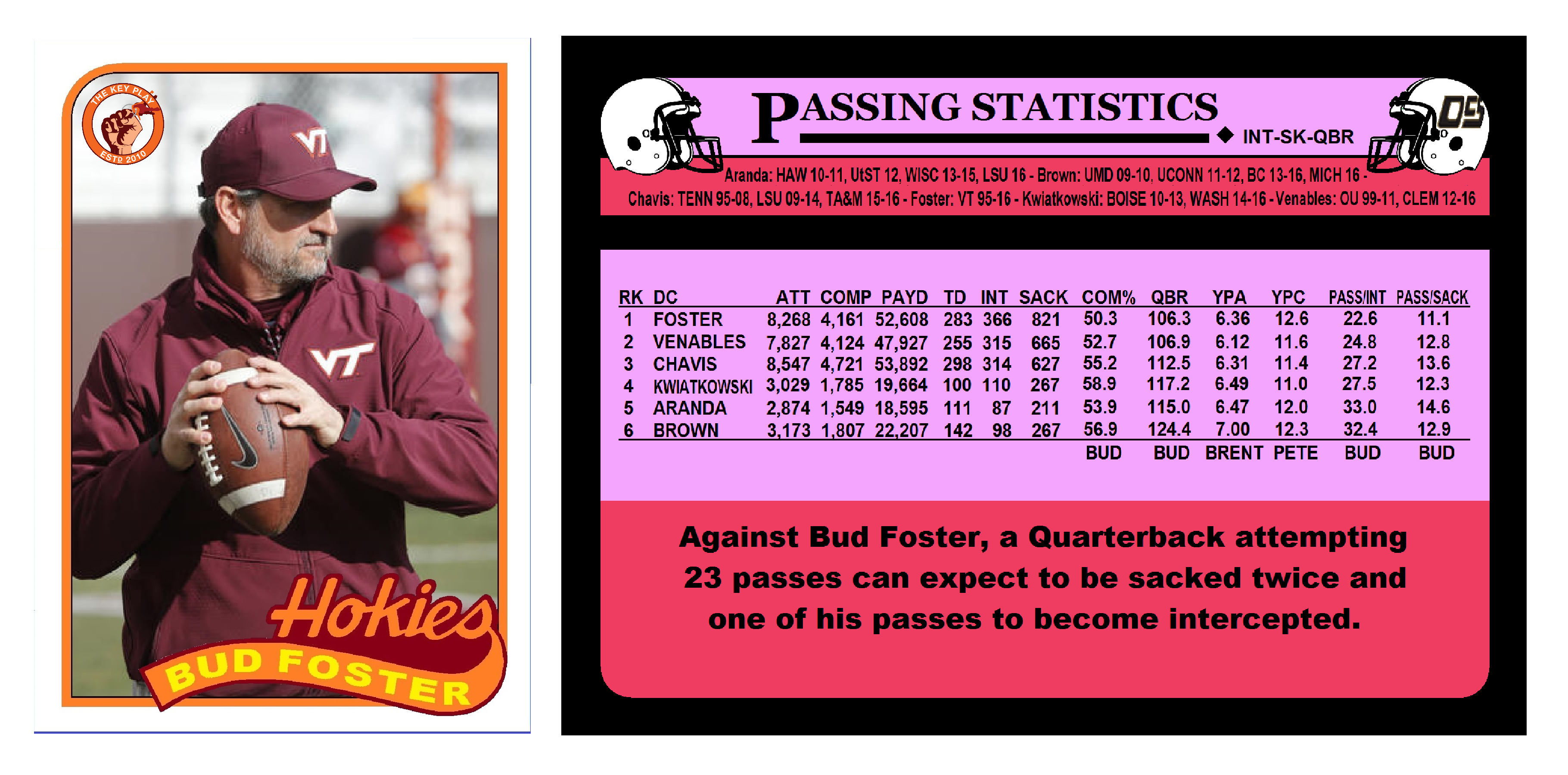
Foster manages to win the passing categories, but not without a hiccup. He typically angles towards a high risk scheme, where less passes are completed to the correct team, but those that connect typically end up as a higher reward for the offense. This wasn't as big of a blowout as the first-place finishes in completion percentage, QBR, rates of sacks and interceptions would have you think; he did finish near the bottom in both YPA and YPC.
But this isn't by accident, either. And personally, I enjoy watching sacks and interceptions.
Let's continue with a somewhat random grouping of situational statistics.

Foster manages to come in first everywhere except the red zone in these comparisons. He finishes one-tenth of a percent behind Pete Kwiatkowski in red zone scoring and third place behind Chavis and Aranda in red zone touchdowns.
Phil Steele aficionados, you'll recognize Yards per Play is listed here. Steele uses that lone statistic as its own power ranking; he tracks this list weekly during the regular season. Foster managed to edge out Venables at 4.68 - 4.70 Yards per play, with the rest of the DCs falling further behind.
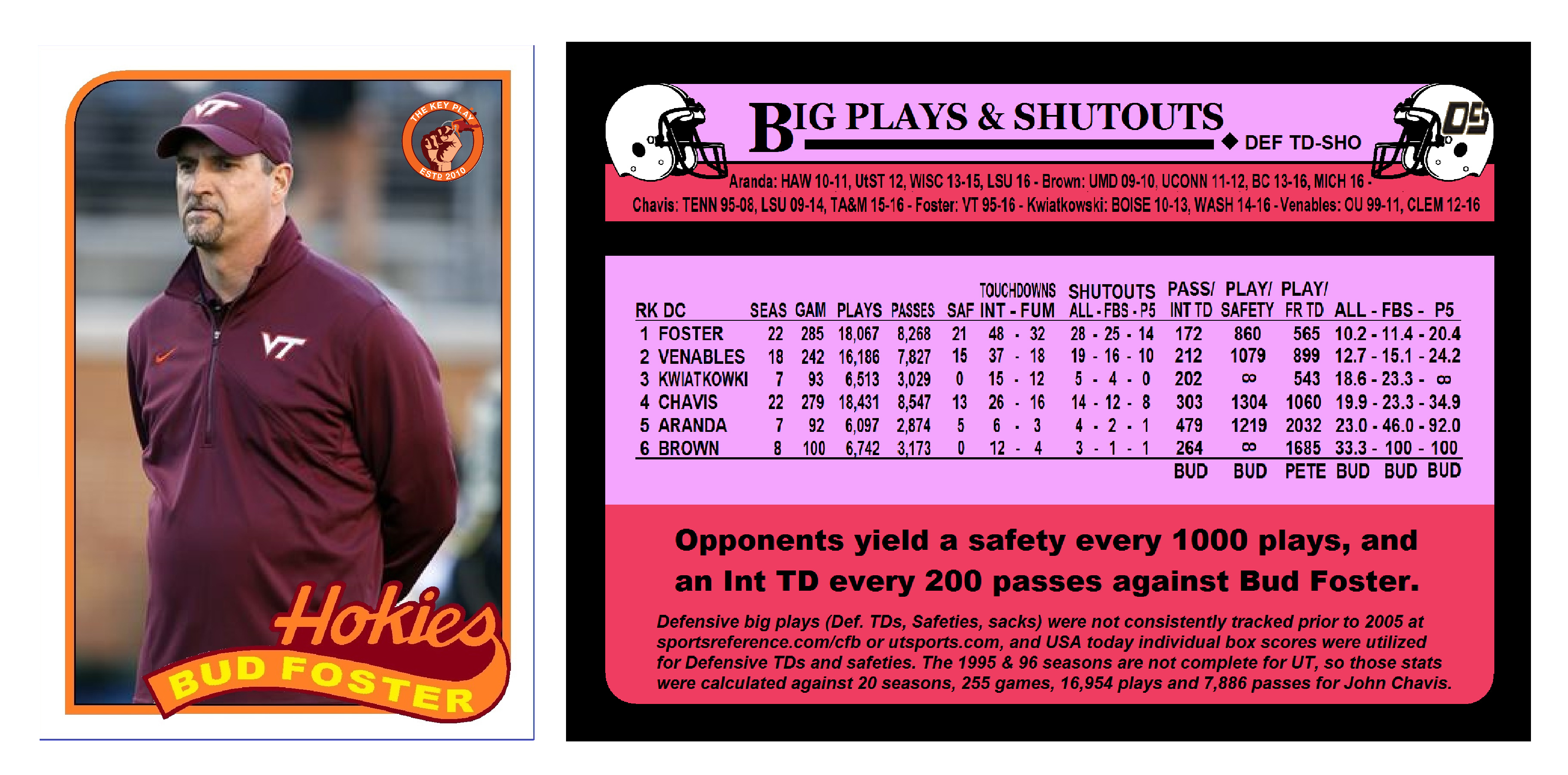
Big Plays and Shutouts. If there was any doubt who would be kicking stats and taking games on this comparison, let me be the first to introduce you to college football.
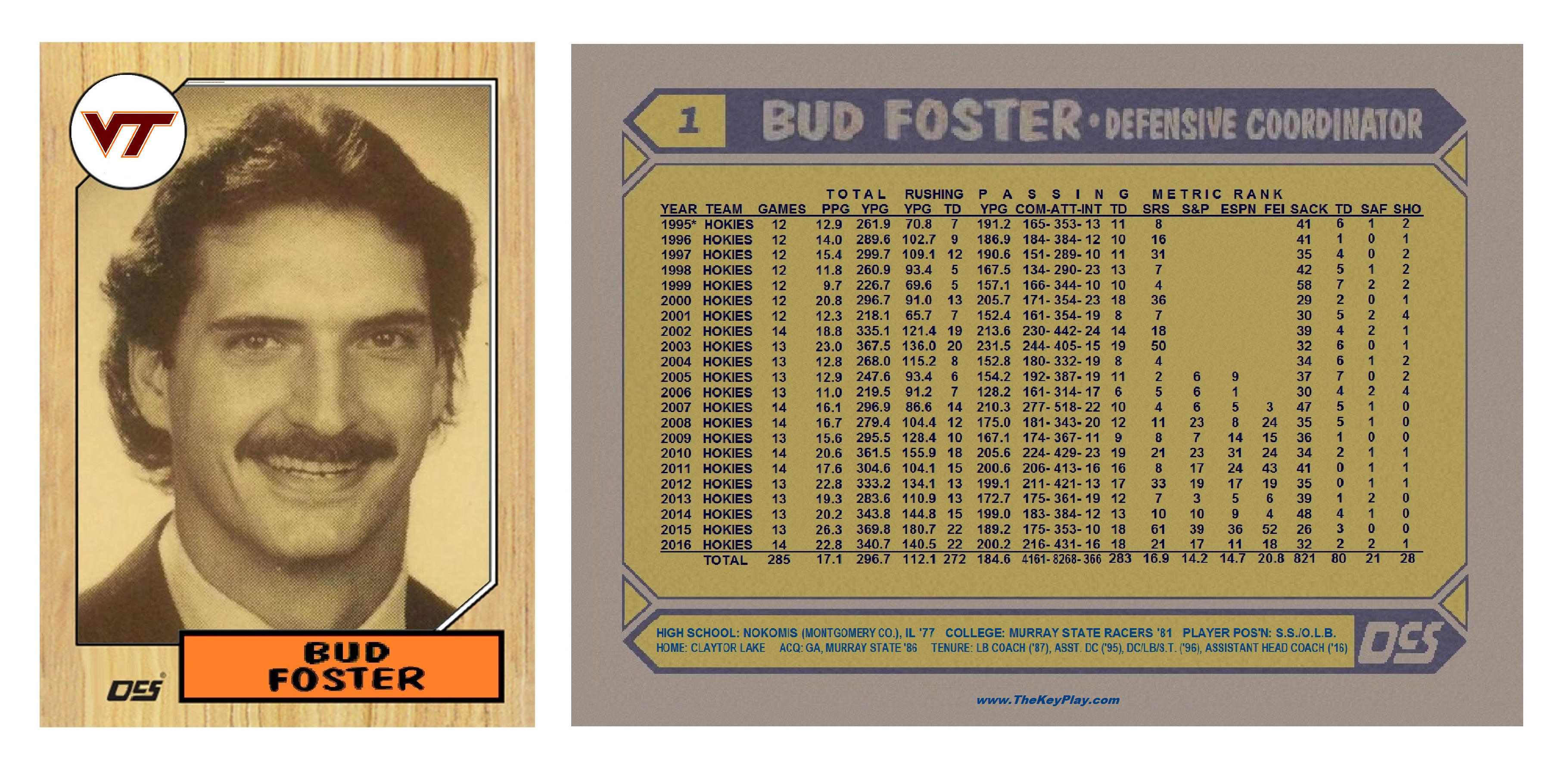
Unfortunately, defensive coordinators are prohibited by contract from issuing sentient smiles. Fortunately, Murray State has yearbooks that predate said statutes.
Who's the best of the bunch?
Brent Venables finished a season in which he hoisted the national championship trophy and won the Frank Broyles award. Of course he's the "hottest" defensive coordinator right now.
Objectively, there's not much that separates these six elite defensive coordinators. Can I make the case that Bud Foster is better than the rest of the group? Sure, but I walked into this with a bias. No matter who you back in this argument, it's realistically and statistically pretty damn close.
References
Sports-reference.com/cfb is responsible for about half of the data in this analysis. 247Sports.com, ESPN.com, cfbstats.com, footballoutsiders.com/stats, usatoday.com/sports/collegefootball, and Philsteele.com were used heavily, and/or very helpful in filling in the gaps.
Thank you HokieSports for keeping accurate season statistics all the way back to 1987! Not many college football team sites are this reliable. These sites are:
Soonersports.com, clemsontigers.com, utsports.com, lsusports.net, 12thman.com, uconnhuskies.com, bceagles.com, mgoblue.com, umterps.com, broncosports.com, gohuskies.com, utahstateaggies.com, uwbadgers.com, and hawaiiathletics.com.
Topps trading card company 1987 and 1989 baseball cards were both instrumental in my childhood and in the creation of these graphics.
Also, thank you cfb.reddit.com: the timely thread from u/DucksGoQuackQuack!, and an eloquent counterpoint, as evidenced by upvotes u/Goodmorningdave.

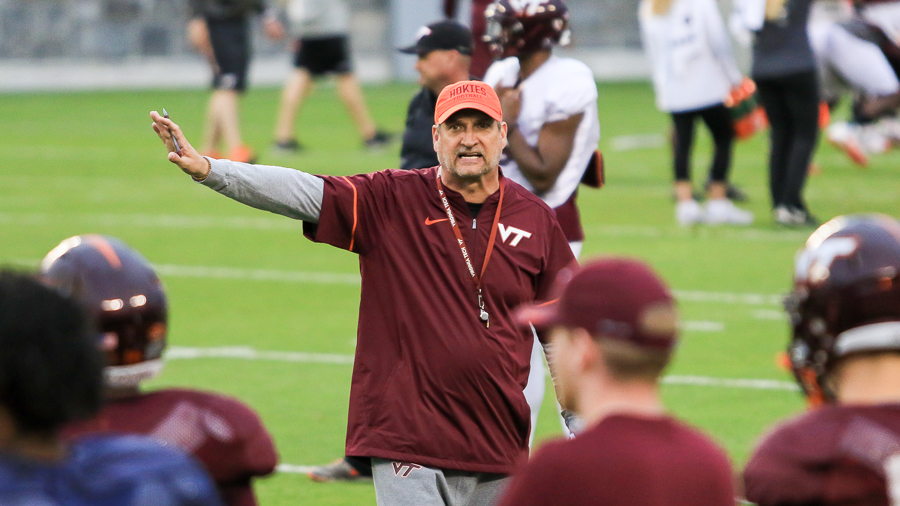
Comments
Please join The Key Players Club to read or post comments.
Please join The Key Players Club to read or post comments.
Please join The Key Players Club to read or post comments.
Please join The Key Players Club to read or post comments.
Please join The Key Players Club to read or post comments.
Please join The Key Players Club to read or post comments.
Please join The Key Players Club to read or post comments.
Please join The Key Players Club to read or post comments.
Please join The Key Players Club to read or post comments.
Please join The Key Players Club to read or post comments.
Please join The Key Players Club to read or post comments.
Please join The Key Players Club to read or post comments.
Please join The Key Players Club to read or post comments.
Please join The Key Players Club to read or post comments.
Please join The Key Players Club to read or post comments.
Please join The Key Players Club to read or post comments.
Please join The Key Players Club to read or post comments.
Please join The Key Players Club to read or post comments.
Please join The Key Players Club to read or post comments.
Please join The Key Players Club to read or post comments.
Please join The Key Players Club to read or post comments.
Please join The Key Players Club to read or post comments.
Please join The Key Players Club to read or post comments.
Please join The Key Players Club to read or post comments.
Please join The Key Players Club to read or post comments.
Please join The Key Players Club to read or post comments.
Please join The Key Players Club to read or post comments.
Please join The Key Players Club to read or post comments.
Please join The Key Players Club to read or post comments.
Please join The Key Players Club to read or post comments.
Please join The Key Players Club to read or post comments.
Please join The Key Players Club to read or post comments.
Please join The Key Players Club to read or post comments.
Please join The Key Players Club to read or post comments.
Please join The Key Players Club to read or post comments.
Please join The Key Players Club to read or post comments.
Please join The Key Players Club to read or post comments.
Please join The Key Players Club to read or post comments.
Please join The Key Players Club to read or post comments.
Please join The Key Players Club to read or post comments.
Please join The Key Players Club to read or post comments.
Please join The Key Players Club to read or post comments.
Please join The Key Players Club to read or post comments.
Please join The Key Players Club to read or post comments.
Please join The Key Players Club to read or post comments.
Please join The Key Players Club to read or post comments.
Please join The Key Players Club to read or post comments.
Please join The Key Players Club to read or post comments.
Please join The Key Players Club to read or post comments.
Please join The Key Players Club to read or post comments.
Please join The Key Players Club to read or post comments.
Please join The Key Players Club to read or post comments.
Please join The Key Players Club to read or post comments.